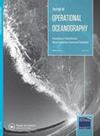Assessment of Coringa Mangrove shoreline migration using geospatial techniques
IF 2.4
3区 地球科学
Q4 METEOROLOGY & ATMOSPHERIC SCIENCES
引用次数: 1
Abstract
ABSTRACT Coringa Mangroves in the Kakinada Bay have evolved as the second-largest mangroves in the East Coast of India over the last century. The Coringa Mangrove shoreline has accreted considerably in the past decades as observed from the satellite imageries, adding value to the natural biodiversity of flora and fauna. This study is focused on quantifying the long term changes of Coringa mangrove shoreline using the Landsat imageries for years 1977, 1988, 2000, and 2013 using the Digital Shoreline Analysis System. For a mangrove shoreline length of 20.5 km, 41 transects were cast at an interval of 500 m for calculating the change and their migration distance using three statistical methods, namely End Point Rate (EPR), Net Shoreline Movement (NSM) and Linear Regression Rate (LRR). Results showed that there was considerable growth of mangroves in the bay leading to the seaward migration of the mangrove shoreline from the year 1977–2013. The study observed the difference in the mangrove shoreline migration dynamics in the South-eastern (near the bottom of the spit) and the western part of the Kakinada Bay. The calculated average degradation rate due to erosion is −5.19 m.yr−1 and the average accretion rate leading to their growth is 14.83 m.yr−1 for all transects of the 20.5 km mangrove shoreline stretch during this period. The results hold importance as they help in identifying the regions prone to mangrove degradation and enable management planning for the protection of the eroding stretch of the mangrove shoreline.利用地理空间技术评价科林加红树林岸线迁移
在过去的一个世纪里,卡基纳达湾的科林加红树林已经发展成为印度东海岸的第二大红树林。从卫星图像中观察到,在过去的几十年里,科林加红树林海岸线已经大大增加,增加了动植物的自然生物多样性。本研究采用数字海岸线分析系统,利用1977年、1988年、2000年和2013年的陆地卫星图像,量化了科林加红树林海岸线的长期变化。以20.5 km的红树林岸线为研究对象,采用终点率(End Point Rate, EPR)、净岸线移动率(Net shoreline Movement, NSM)和线性回归率(Linear Regression Rate, LRR) 3种统计方法,每隔500 m投下41个样带,计算岸线变化及其迁移距离。结果表明:1977-2013年,黄河湾红树林生长明显,导致红树林海岸线向海迁移;该研究观察了Kakinada湾东南部(靠近吐槽底部)和西部红树林海岸线迁移动态的差异。计算得到的平均侵蚀降解率为−5.19 m。Yr−1,导致其生长的平均吸积速率为14.83 m。在此期间,20.5公里红树林海岸线延伸的所有样带的Yr−1。这些结果具有重要意义,因为它们有助于确定容易发生红树林退化的区域,并有助于管理规划,以保护红树林海岸线的侵蚀延伸。
本文章由计算机程序翻译,如有差异,请以英文原文为准。
求助全文
约1分钟内获得全文
求助全文
来源期刊
CiteScore
7.50
自引率
9.70%
发文量
8
审稿时长
>12 weeks
期刊介绍:
The Journal of Operational Oceanography will publish papers which examine the role of oceanography in contributing to the fields of: Numerical Weather Prediction; Development of Climatologies; Implications of Ocean Change; Ocean and Climate Forecasting; Ocean Observing Technologies; Eutrophication; Climate Assessment; Shoreline Change; Marine and Sea State Prediction; Model Development and Validation; Coastal Flooding; Reducing Public Health Risks; Short-Range Ocean Forecasting; Forces on Structures; Ocean Policy; Protecting and Restoring Ecosystem health; Controlling and Mitigating Natural Hazards; Safe and Efficient Marine Operations

 求助内容:
求助内容: 应助结果提醒方式:
应助结果提醒方式:


